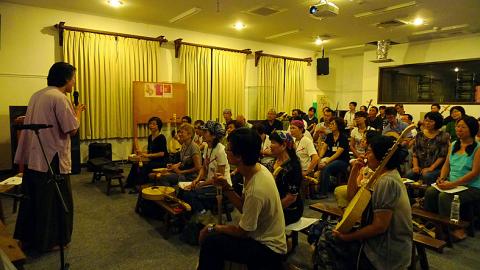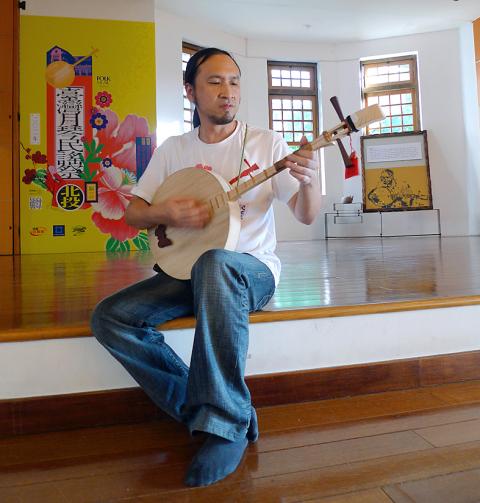Beitou District (北投), famed for its hot springs, is doubling as host to a musical feast this weekend. The Taiwan Moon Lute Folk Music Festival (台灣月琴民謠祭) comprises concerts tomorrow and Sunday at the Beitou Hot Springs Museum by a slew of the country’s top folk musicians.
The new festival began earlier this month with a series of lectures by folk virtuosos, who demonstrated the two-string instrument’s widespread use in Taiwanese music.
Iconic musician Chen Ming-chang (陳明章), who organized the event, said the moon lute, or yueqin (月琴), is a representative instrument of Hoklo music and commonly used in a variety of genres: Gezai opera (歌仔戲); Hengchun folk music (恆春調); nanguan (南管); beiguan (北管); chia-ko (車鼓); and liam kua (唸歌), a Taiwanese performance art form that interweaves talking and singing.

Photo courtesy of Taiwan Moon Lute Folk Music Association
“The yueqin is to Taiwan as the samisen is to Japan, or morin khuur to Mongolia,” Chen said, referring to stringed instruments from those countries. “It represents our culture’s most classical characteristics. I hope one day people will come to Taiwan to see yueqin or liam kua shows, just like we go to see samisen or kabuki shows when visiting Japan.”
Tomorrow evening there will be an open jam session with renowned musicians, including Chen and Lin Sheng-xiang (林生祥), that is open to anybody who wants to show off his or her yueqin skills.
Chen said the instrument generates a distinctive sound that is somewhat similar to that of blues music. Because of its simplicity, the yueqin’s timbre is more fluid and flexible than that of more elaborately designed Chinese instruments.

Photo courtesy of Taiwan Moon Lute Folk Music Association
“After Zheng Chenggong (鄭成功, better known as Koxinga) and his gang came to Taiwan, it was unlikely that they would go back to China just to buy a musical instrument. They were poor and could only use what was available at hand. They put together some wood planks, and now you have this simple tool that can produce amazingly complex music,” said Chen, who has taught yueqin to some 200 students in Beitou over the past two years.
On Sunday, octogenarian folk legends including Chu Ting-chun (朱丁順), under whom Chen has studied yueqin and Hengchun folk tunes, as well as Yang Hsiu-ching (楊秀卿) and Wang Yu-chuan (王玉川), both of whom are highly revered liam kua virtuosos, will perform.
Hailing from Yunlin County, the Wu Tien-lo (吳天羅) family’s Hsuyang Chia-ko Troupe (旭陽車鼓劇團) will show Taipei audiences the art of chia-ko, a type of grassroots operatic theater that combines song, dance, spoken dialogue and drama.
All of the festival performances will take place on the lawn outside the museum’s main building.
Aside from the musical performances, an exhibition of hand-painted moon lutes will run through Oct. 2 inside the museum, which was built in 1913 during the Japanese colonial era and designated as a heritage site in 1997. It is located a short, pleasant walk from Xinbeitou MRT Station (新北投捷運站).

That US assistance was a model for Taiwan’s spectacular development success was early recognized by policymakers and analysts. In a report to the US Congress for the fiscal year 1962, former President John F. Kennedy noted Taiwan’s “rapid economic growth,” was “producing a substantial net gain in living.” Kennedy had a stake in Taiwan’s achievements and the US’ official development assistance (ODA) in general: In September 1961, his entreaty to make the 1960s a “decade of development,” and an accompanying proposal for dedicated legislation to this end, had been formalized by congressional passage of the Foreign Assistance Act. Two

Despite the intense sunshine, we were hardly breaking a sweat as we cruised along the flat, dedicated bike lane, well protected from the heat by a canopy of trees. The electric assist on the bikes likely made a difference, too. Far removed from the bustle and noise of the Taichung traffic, we admired the serene rural scenery, making our way over rivers, alongside rice paddies and through pear orchards. Our route for the day covered two bike paths that connect in Fengyuan District (豐原) and are best done together. The Hou-Feng Bike Path (后豐鐵馬道) runs southward from Houli District (后里) while the

March 31 to April 6 On May 13, 1950, National Taiwan University Hospital otolaryngologist Su You-peng (蘇友鵬) was summoned to the director’s office. He thought someone had complained about him practicing the violin at night, but when he entered the room, he knew something was terribly wrong. He saw several burly men who appeared to be government secret agents, and three other resident doctors: internist Hsu Chiang (許強), dermatologist Hu Pao-chen (胡寶珍) and ophthalmologist Hu Hsin-lin (胡鑫麟). They were handcuffed, herded onto two jeeps and taken to the Secrecy Bureau (保密局) for questioning. Su was still in his doctor’s robes at

Mirror mirror on the wall, what’s the fairest Disney live-action remake of them all? Wait, mirror. Hold on a second. Maybe choosing from the likes of Alice in Wonderland (2010), Mulan (2020) and The Lion King (2019) isn’t such a good idea. Mirror, on second thought, what’s on Netflix? Even the most devoted fans would have to acknowledge that these have not been the most illustrious illustrations of Disney magic. At their best (Pete’s Dragon? Cinderella?) they breathe life into old classics that could use a little updating. At their worst, well, blue Will Smith. Given the rapacious rate of remakes in modern